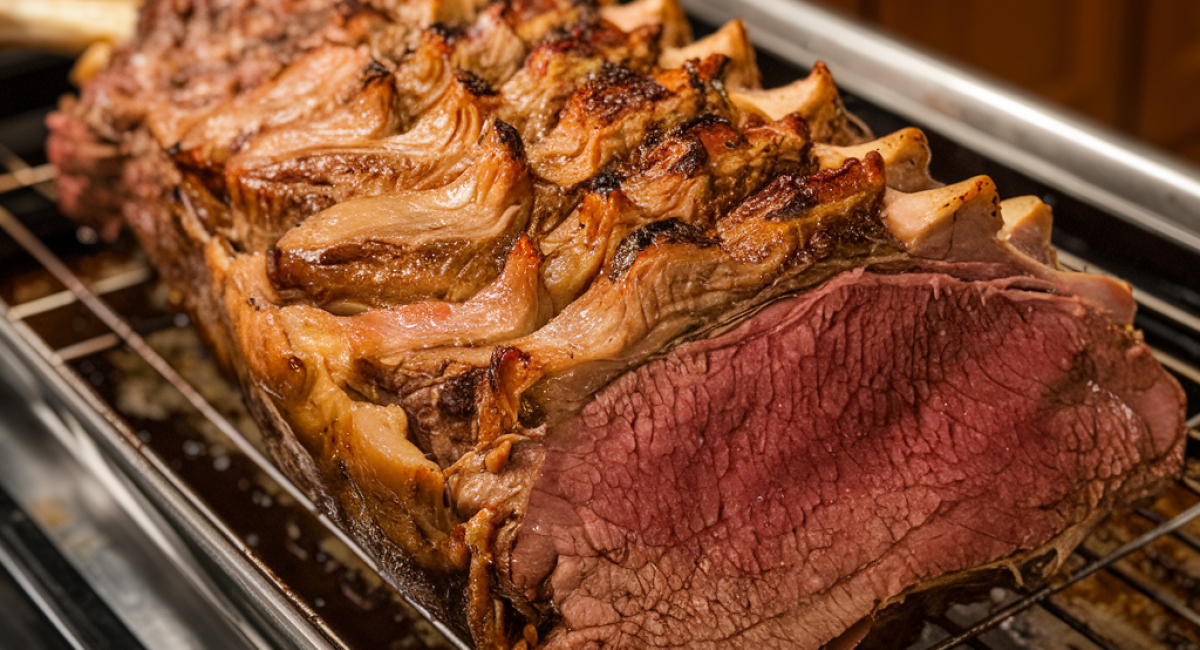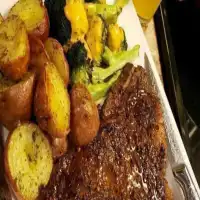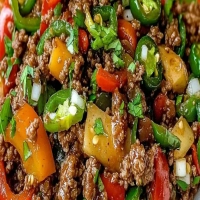Prime Rib recipe for Christmas - OMG😱 DON'T LOSE THIS😋

Description
Ah, Christmas—the season of twinkling lights, festive gatherings, and, let’s be honest, some of the most delectable food experiences we look forward to all year. One dish that stands head and shoulders above the rest in terms of holiday splendor is the prime rib roast. This succulent cut of meat, renowned for its tenderness and rich flavor, has graced the tables of holidays past and will continue to do so for many more to come.
Originating from the rib section of the cow, prime rib is a roaster’s dream, exuding a sense of luxury with its marbled fat and impressive presentation. Imagine inviting family and friends over to share a perfectly cooked, juicy prime rib roast, its aromatic scent filling the room as it rests before being carved into thick, meaty slices. Not only is this dish a true centerpiece, but it’s also easier to make than many would think, perfect for even novice cooks eager to impress.
What makes this prime rib roast special isn’t just its taste; it’s also steeped in the spirit of togetherness, warmth, and celebration. The anticipation of this holiday feast alone can bring a sense of joy and excitement that’s hard to replicate. So roll up your sleeves, put on your favorite holiday tunes, and let’s embark on this culinary journey to create a Christmas dish that’s sure to become a cherished family tradition.
Ingredients
- For this glorious prime rib roast, you will need the following ingredients:
- 1 bone-in prime rib roast (6-8 pounds)
- 2 tablespoons olive oil
- Salt, to taste
- Freshly ground black pepper, to taste
- Garlic cloves, optional - can enhance flavor if desired
- Optional Add-ins & Variations:
- - Fresh herbs such as rosemary or thyme, for an extra punch of flavor.
- - A drizzle of balsamic reduction for added decadence.
- - Horseradish or mustard for serving, offering a tangy contrast to the richness of the meat.
Preparation Method
1. Bring prime rib to room temperature by removing it from the refrigerator 1-2 hours before cooking.
2. Preheat the oven to 500 degrees Fahrenheit.
3. Place the prime rib on a rack in a roasting pan.
4. Rub olive oil over the roast.
5. Season generously with salt and black pepper.
6. Optionally, insert garlic cloves into slits in the roast.
7. Roast in the oven at 500 degrees Fahrenheit for 15 minutes.
8. Reduce the oven temperature to 325 degrees Fahrenheit.
9. Cook until the desired internal temperature is reached (135 degrees for medium-rare, 140 degrees for medium, 150 degrees for well done).
10. Remove from the oven and let it rest for 15-20 minutes.
11. Slice against the grain and serve on a platter, optionally garnished with herbs or vegetables.
Tips and Conclusion
One of the great joys of a prime rib roast is how well it pairs with various sides and sauces. Consider serving it alongside classic accompaniments like creamy mashed potatoes, roasted Brussels sprouts, or a fresh, crunchy salad. A homemade horseradish sauce can complement the richness of the beef beautifully, while a simple red wine reduction can elevate the entire dish.
If you find you have leftovers (a situation that should be celebrated), store sliced beef in an airtight container in the refrigerator, where it can enjoy a shelf life of about 3-4 days. Reheat gently to retain its delicious qualities or reinvent it the next day with sandwiches, beef stroganoff, or a hearty soup.
As you gather around the table to enjoy this Instagram-worthy prime rib roast, remember that this recipe is not just about the ingredients or the cooking technique. It’s about creating memories, sharing laughter, and celebrating the love that goes into the food we share. The satisfaction you'll feel as you carve into that perfectly roasted prime rib, and the joy in your loved ones' eyes as they indulge in the succulent meat, is truly priceless.
We hope this prime rib recipe becomes a staple in your holiday repertoire. Don’t stop here! After delighting in this sumptuous roast, why not explore more delightful recipes that can add extra flair to your festive meals? Check out our selection for classic sides, decadent desserts, or even alternative roasts that will surely make your gatherings unforgettable.
So plug in your apron, take a deep breath, and enjoy this culinary adventure—after all, it’s not just about the food, it’s about the love and connection that it brings. Share your prime rib journey with others, invite them to try it out, and let’s keep the festive spirit alive all year round!







